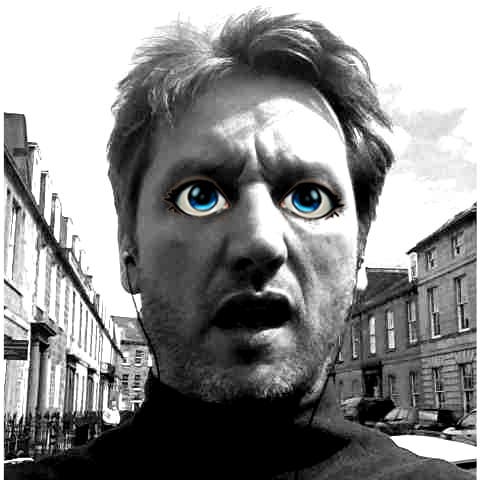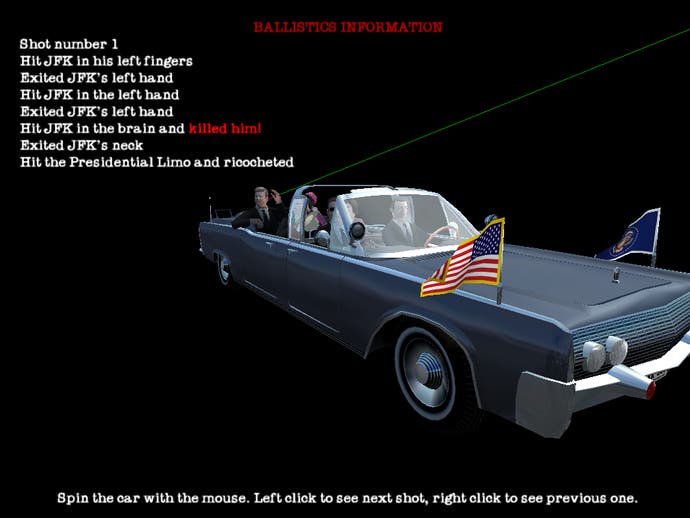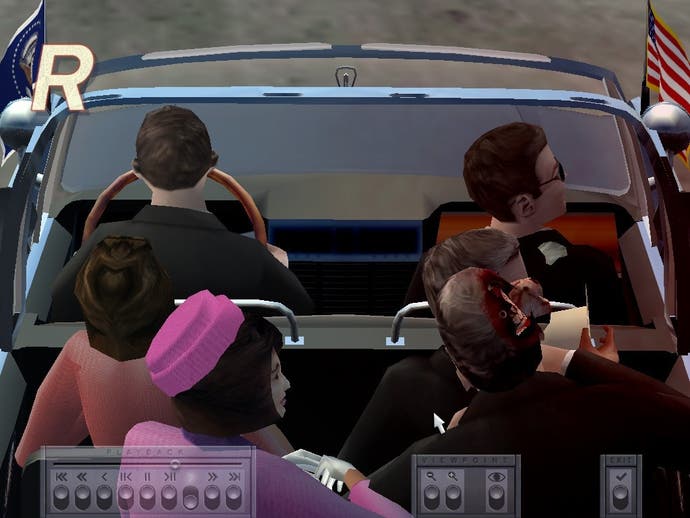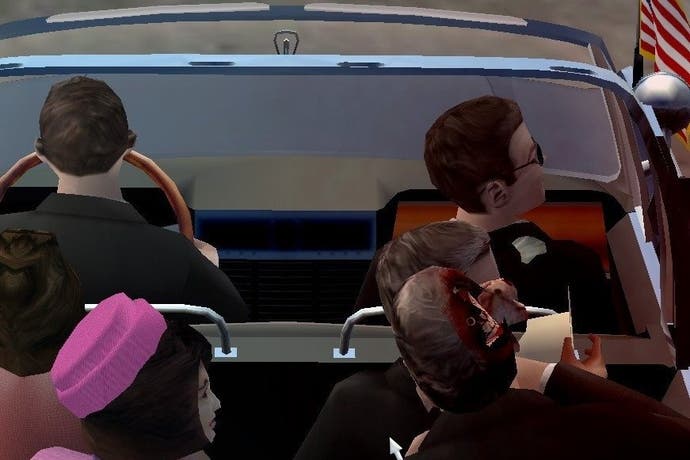The video game assassination of JFK
The game that re-opened one of America's deepest wounds.
41 years after the assassination of the 35th president of the United States, Kirk Ewing was about to stand trial for his murder.
"I was in Times Square sitting in the green room at Good Morning America," he recalls. "A basketball player appeared on the show before me. He'd recently punched someone in the crowd during a game and had been invited onto the programme to apologise. He made his apology and promptly announced the launch of his new rap CD." As the athlete left the stage and the applause died away, Ewing was ushered onto the TV programme's set. Ewing sat down and the presenter looked him the eye. After a moment's pause, he asked: "Why did you kill John F. Kennedy?"
Ewing knows controversy. "I've had to deal with the consequences of my actions a great deal over my life, so it was no huge surprise," he says in his mischievous Scottish brogue. Before joining the video game industry he worked in television, producing an episode of the current affairs programme Dispatches for Channel 4 and making several appearances on the long-running show GamesMaster.

In 2002 he worked as game director on State of Emergency, a game published by Rockstar Games that was denounced by Washington state politicians for replicating the 1999 World Trade Organization riots. But JFK: Reloaded, a game which allowed players to assume the role of Lee Harvey Oswald, the 24-year-old sniper who murdered the president on November 22, 1963, hit a different kind of national nerve. The result was controversy on a scale Ewing never anticipated.
"I was ferried by car around New York City, moving from TV station to radio station and back again," Ewing recalls. "For an entire week intelligent people unpicked my personality in front of an audience of millions." This trial by media was just the start of the onslaught.
"I had an unbelievable amount of violence directed towards me," he says. "There were numerous death threats in the mail. The Daily Mail door-stepped my parents to see what they thought about what I'd done - as if they knew what was going on. A Reverend in the mid-west called me a 'purveyor of electronic wickedness'." Later, when the Kennedy family heard about the game's existence, JFK's brother, Ted, denounced the work as 'despicable'. "I got that one printed on a T-shirt," says Ewing. "Perhaps my favourite email, the one that seems to sum up the whole ignorance around the debate simply read: 'You gay, Swedish asshole.'"
*****
Ewing's idea to create a game based on one of the most tragic moments in recent American history was a response to what he saw as the broadening scope of most video games. "Having worked on large video game projects I wanted to do something smaller," he says. "Rather than building an enormous, expansive world I wondered about exploring a single moment in time through a game." Ewing, who had recently set up a small studio in Scotland called Traffic Games, wanted to make a game that was based on a real-world event. "I loved the idea that we could make games with a current affairs agenda, rather than just more stuff about orcs and goblins."
He initially considered the moon landing as a topic. "But JFK's assassination made the most sense because there was so much information in the public domain about what happened that day. Not only that, it was also ballistics exercise. Video games are really good at ballistics exercises." Ewing was also confident that the subject matter had been discussed enough in other media to warrant a video game approach. "I figured: 'If this subject could be discussed in film and documentary, why shouldn't it be a candidate for a game?'

Ewing's studio was too small to take on such an ambitious project so he approached a friend of his at one of the creators of the controversial Carmageddon series, to see if he and the team at Stainless Games would partner in the development. "My friend is like the Charles Manson of games," says Ewing. "He loved the idea. So Stainless dusted the Carmageddon engine and together we did everything we to make the the most realistic interpretation of what happened that day as possible." The team carefully reconstructed the street in Dallas, Texas where JFK was shot, placing each lamppost in location, and setting the wind speed and direction to reflect that day's conditions.
"Part of the logic for us was to disprove the conspiracy by demonstrating how it was possible for Oswald to make all three shots."
The team opted to ignore the conspiracy theories surrounding the assassination and to focus instead entirely on Oswald's role as the sniper. "The more that I looked at the day's events through the lens of the game's engine the clearer it seemed to me that Oswald had fired all three shots," Ewing says. "In fact, part of the logic for us was to disprove the conspiracy by demonstrating how it was possible for Oswald to make all three shots in the context of the car's speed, the wind and the specification of the rifle he used. When it comes to the ballistics, I think we made a good representation of what it must have been like to look down the barrel of the gun and fire those shots at the president."
Ewing is unequivocal when it comes to the moral dimension of the game: he sees no difference between JFK: Reloaded and Oliver Stone's Oscar-winning 1991 film JFK, which was based on the same events. "I've mercilessly shot people in the hands or face or wherever I could get a bullet into them in countless games," he says. "This is no different in that sense. Beyond that, in a filmed documentary we have the position of a member of the crowd. We are there as the motorcade goes past, spectating. But in the video game, we have Oswald's perspective. For me it's valuable to look at real life tragedy from a variety of different lenses and perspectives."
Launched in November 2004, JFK: Reloaded was one of the first independently released PC download titles. A demo was made freely available while the full game cost $10, a forward-thinking business model at a time when digital distribution was only just beginning to emerge. In order to encourage people to invest in the full version, Ewing devised a competition around the game.
For one month players were able to submit their assassination attempts. The player who most closely matched the shots taken by Oswald, as reported in the Warren Commission Report, would win a prize pot, linked to how much revenue the game had generated (up to $100,000). The final prize money amounted to just $10,712 and was won by a 16-year-old Parisian boy, who went by the handle 'Major_Koenig'. He posted his score the day before the competition closed.
Awarding prize money for replicating JFK's wounds is the one decision that, a decade later, Ewing regrets. "I was naïve," he says. "I underestimated the deepness of affection for Kennedy held by many American people. Maybe in Scotland we didn't think through the reaction. Questions about the prize money were always the toughest to answer. It was a marketing trick, but it muddied the discussion that maybe we could have had if it hadn't been there."
"I got a lot of mail requesting that we 'do Diana'. I thought it could maybe work if you played as one of the scooter riders and had to force the crash..."
That discussion, particularly in America, centred on the transgressive nature of the game, of how it trivialised a taboo subject. The right wing news channel Fox News invited Ewing onto one of its shows and presented him animated mock-ups of other assassinations, demanding to know why these shouldn't also be turned into video games. "This sort of media attempts to shift the news agenda in order to create entertainment," says Ewing. "The whole thing is so complicit. They're using something you've created to create news stories and ratings."
Not everyone was dismayed at the game. "I had some touching commentary from people who wrote to me afterwards," he says. "That day is such a powerful memory in the national consciousness that people would write to me and share what they were doing at the time, cathartically reliving the memory. In time I began to understand that, when people became upset with the game, they were generally just upset at their own memory of the events it depicts, rather than anything in particular we were doing." On Good Morning America, Ewing answered the interviewer's pointed demand calmly. "I explained that I hadn't killed Kennedy because he was already dead when we made the game," Ewing recalls. "The guy continued: 'But don't you think you're teaching children how to assassinate people?' My best response to this one was to point out that we had in fact reignited this moment in history for a nation of children who were otherwise detached from the events. That one worked sometimes..."

As well as public outrage, Ewing also received letters from people requesting that he create a similar game around a different real-life news tragedy. "I got a lot of mail requesting that we 'do Diana'," he says. "I thought it could maybe work if you played as one of the scooter riders and had to force the crash..."
While Ewing believes that the mainstream media's reporting on video games has shifted in the past decade, he is certain that if he were to create another, similar game today, it would be treated in much the same way. "There would be the same derogation by news media and other people who think they're better than the industry that we work in," he says. "People still see games as playful things and not a suitable medium for more serious application."
The desire to use video games as a medium for documentary is laudable, but JFK: Reloaded is, at times, difficult to class as a serious piece of work. While the game's physics were set to 'realistic' by default, the developer also included a 'chaotic' mode, whereby they're greatly exaggerated. Switch this mode on, and the game becomes a riot of crashing, bouncing cars and high-speed antics. In one fan-made YouTube movie, Jackie Kennedy can be seen being catapulted through the front windshield of the presidential limousine, before flying into the air and smashing into the sixth floor window of a nearby building. It is as if Oliver Stone had included a series of anarchic outtakes in the JFK's DVD extras.
Perhaps for this reason, Ewing was awarded with a solemn official condemnation from the Massachusetts House of Representatives. "It's a beautiful document with a official seal," says Ewing. "It reads: 'This resolution condemns the Traffic Gaming Group for attempting to profit from the assassination of JFK and for sensationalising the tragedy of November 22nd, 1963'. It's the most official document that I own. It's my degree." I ask Ewing whether he knows if Oliver Stone received a similar document. "No," he replies. "He got the f***ing Oscar instead, didn't he?"
Righteous condemnation is not the only reaction that Ewing's game has received from the establishment. A few months after the media furore died down, Ewing was invited to speak at the prestigious Sorbonne in Paris. "I spoke in front of an unbelievably charming academic audience," he says. "I explained my intentions with the game and talked through what happened. When I finished I was given a standing ovation." After the applause died down, an elderly gentleman shuffled towards the stage. "He spoke through the translator. And do you know what he said?"
"He said: 'I think what you've done is as important as the moon landings.' How's that for vindication?"


